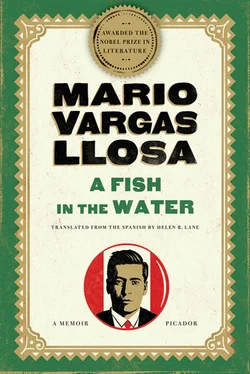Mario Vargas Llosa - A Fish in the Water - A Memoir
Здесь есть возможность читать онлайн «Mario Vargas Llosa - A Fish in the Water - A Memoir» весь текст электронной книги совершенно бесплатно (целиком полную версию без сокращений). В некоторых случаях можно слушать аудио, скачать через торрент в формате fb2 и присутствует краткое содержание. Год выпуска: 2015, Издательство: Macmillan, Жанр: Биографии и Мемуары, на английском языке. Описание произведения, (предисловие) а так же отзывы посетителей доступны на портале библиотеки ЛибКат.
- Название:A Fish in the Water: A Memoir
- Автор:
- Издательство:Macmillan
- Жанр:
- Год:2015
- ISBN:нет данных
- Рейтинг книги:3 / 5. Голосов: 1
-
Избранное:Добавить в избранное
- Отзывы:
-
Ваша оценка:
- 60
- 1
- 2
- 3
- 4
- 5
A Fish in the Water: A Memoir: краткое содержание, описание и аннотация
Предлагаем к чтению аннотацию, описание, краткое содержание или предисловие (зависит от того, что написал сам автор книги «A Fish in the Water: A Memoir»). Если вы не нашли необходимую информацию о книге — напишите в комментариях, мы постараемся отыскать её.
is a twofold book: a memoir of one of Latin America's most celebrated witers, beginning with his birth in 1936 in Arequipa, Peru; and the story of his organization of the reform movement which culminated in his bid for the Peruvian presidency in 1990.
A Fish in the Water: A Memoir — читать онлайн бесплатно полную книгу (весь текст) целиком
Ниже представлен текст книги, разбитый по страницам. Система сохранения места последней прочитанной страницы, позволяет с удобством читать онлайн бесплатно книгу «A Fish in the Water: A Memoir», без необходимости каждый раз заново искать на чём Вы остановились. Поставьте закладку, и сможете в любой момент перейти на страницу, на которой закончили чтение.
Интервал:
Закладка:
Both were very different trips from the ones I had made in the first campaign; instead of the multicolor rallies in the town squares and the dinners and receptions at night, there were only visits to markets, cooperatives, associations of informales , itinerant peddlers, and dialogues and meetings with labor unions, members of communes, leaders of neighborhoods, and communities and associations of all sorts, which began at dawn and ended after the stars had come out — held usually out of doors, by candlelight, and during which dozens of times, hundreds of times, I lost my voice and even my sense of discernment, as I tried to disprove the lies concerning the economic shock, education, and the million unemployed. I was so exhausted that, in order to preserve the little energy I had left, I remained silent as we moved about from place to place, and even when the trips lasted only a few minutes, I usually fell fast asleep. Despite such efforts to overcome my fatigue, I was unable, amid an endless interchange of questions and answers, in the Central Market of Arequipa, to keep myself from losing consciousness for a few minutes. The amusing thing is that when I came to, in a daze, the same leader was still perorating, not realizing what had happened to me.
I noticed the tension and the paroxysm reached by the electoral confrontation within Piura, in particular — a part of the country considered relatively peaceful — where I was obliged to tour the towns and villages that separate Sullana from San Lorenzo Colony amid great violence, and where my speeches frequently had as their audio background the jeers and catcalls of counterdemonstrators or the insults and punches my supporters and my adversaries were exchanging round about me. My grimmest memory of those days is that of my arrival, one torrid morning, in a little settlement between Ignacio Escudero and Cruceta, in the valley of Chira. Armed with sticks and stones and all sorts of weapons to bruise and batter, an infuriated horde of men and women came to meet me, their faces distorted by hatred, who appeared to have emerged from the depths of time, a prehistory in which human beings and animals were indistinguishable, since for both life was a blind struggle for survival. Half naked, with very long hair and fingernails never touched by a pair of scissors, surrounded by emaciated children with huge swollen bellies, bellowing and shouting to keep their courage up, they hurled themselves on the caravan of vehicles as though fighting to save their lives or seeking to immolate themselves, with a rashness and a savagery that said everything about the almost inconceivable levels of deterioration to which life for millions of Peruvians had sunk. What were they attacking? What were they defending themselves from? What phantoms were behind those threatening clubs and knives? In the wretched village there was no water, no light, no work, no medical post, and the little school hadn’t been open for years because it had no teacher. What harm could I have done them, when they no longer had anything to lose, even if the famous “shock” had proved to be as apocalyptic as propaganda made it out to be? Of what free education could those poor creatures have been deprived, when their only school had already long since been closed by national poverty? With their tremendous defenselessness, they were the best possible living proof that Peru could not continue to exist any longer in the populist delirium, in the demagogic lie of the redistribution of a wealth decreasing by the day, providing instead dramatic evidence of the need for changing direction, for creating work and wealth through forced marches, for rectifying policies that were each day driving more new masses of Peruvians into a state of precariousness and primitivism that (with the exception of Haiti) no longer had any equivalent in Latin America. There was no way even to try to explain this to them. Despite the shower of stones, which Professor Oshiro and his colleagues tried to ward off with their coats spread out like an awning over my head, I made several attempts to talk to them over a loudspeaker, from the flatbed of a truck, but the outcries and the contention made such a din that I was forced to give up. That night, in the Hotel de Turistas in Piura, those faces and fists of exacerbated Piurans, who would have given anything to lynch me, made me reflect for a good while, before falling into my usual troubled sleep, on the incongruousness of my political adventure, and wish even more impatiently than on other days for June 10, liberation day, to arrive.
On May 29, 1990, shortly after 9 p.m., an earthquake shook the northeastern area of the country, causing large-scale damage in the Amazon departamentos of San Martín and Amazonas. One hundred fifty people were killed and at least a thousand were injured in localities in the departamento of San Martín: Moyobamba, Rioja, Soritor, and Nueva Cajamarca, as well as in Rodríguez de Mendoza in Amazonas, where more than half the dwellings had collapsed or were damaged. This tragedy allowed me to confirm the good work that had been done by Ramón Barúa and Jaime Crosby with the PAS, which, the moment the news of the earthquake reached us, we put to work mobilizing all possible aid. On the morning after the catastrophe, Patricia and former president Fernando Belaunde left for the devastated areas on a plane loaded with fifteen tons of medicine, clothing, and food supplies. It was the first help to arrive there, and I believe the only help, for a week later, when I visited the region on June 6, on another plane loaded with field tents, boxes of serum and medicine kits, the few doctors, nurses, and medical assistants who were doing their best to aid the survivors and the injured had only the resources of the PAS to count on. This program, organized with the limited resources of an opposition party, which the government harassed, was capable under those circumstances of accomplishing all by itself something that the Peruvian government was unable to do. The images in Soritor, Rioja, and Rodríguez de Mendoza were monstrous: hundreds of families were sleeping in the open, under the trees, after having lost everything, and men and women were continuing to dig in the rubble, in search of people who were still missing. In Soritor there was practically not a single habitable dwelling left, for the ones that had not entirely collapsed had lost their roofs and walls and risked tumbling down from one moment to the next. As though terrorism and political raving had not been enough, nature too was venting its fury on the Peruvian people.
A cheerful and pleasant note during the second round of campaigning — sunbeams amid a sky almost always covered with dark clouds or jarred by thunder and rent by lightning — was provided by popular celebrities from the world of radio, TV, and sports who, in the last weeks, came out in favor of my candidacy, and accompanied me on my visits to the squatter settlements of the young towns and the popular districts of Lima, where their presence gave rise to touching scenes. The famous women’s volleyball team selected to represent Peru, which won the world semifinals — Cecilia Tait, Lucha Fuentes, and Irma Cordero in particular — couldn’t get out of giving demonstrations with the volleyball in each place we visited, and Gisela Valcárcel’s admirers besieged her to the point that our bodyguards had to rush to her rescue. From May 10 on, when the soccer star Teófilo Cubillas came to Barranco to offer me his public support, until the eve of the election, this was my routine each morning: receiving delegations of singers, composers, sports stars, actors, comedians, commentators, folklorists, ballerinas, whom, after a brief chat, I accompanied to the front door opening onto the street, where, before the press, they urged their colleagues to vote for me. Lucho Llosa was the one who had the idea of making these shows of support public and the one who thought up and orchestrated the first of them; others then sprang up spontaneously, and there were so many of them that I found myself obliged, for lack of time, to receive only those that could have a contagious effect on the voters.
Читать дальшеИнтервал:
Закладка:
Похожие книги на «A Fish in the Water: A Memoir»
Представляем Вашему вниманию похожие книги на «A Fish in the Water: A Memoir» списком для выбора. Мы отобрали схожую по названию и смыслу литературу в надежде предоставить читателям больше вариантов отыскать новые, интересные, ещё непрочитанные произведения.
Обсуждение, отзывы о книге «A Fish in the Water: A Memoir» и просто собственные мнения читателей. Оставьте ваши комментарии, напишите, что Вы думаете о произведении, его смысле или главных героях. Укажите что конкретно понравилось, а что нет, и почему Вы так считаете.












